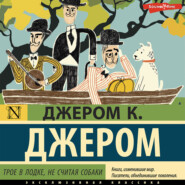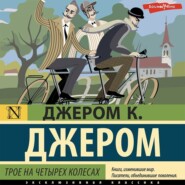По всем вопросам обращайтесь на: info@litportal.ru
(©) 2003-2024.
✖
Novel Notes
Настройки чтения
Размер шрифта
Высота строк
Поля
“My cousin cudgelled his brains again. He did not intend to let a purchaser slip through his fingers if he could help it. At last a bright thought flashed into his mind. ‘I’ll tell you what we could do,’ he said. ‘There’s a piece of waste land the other end of the village that we’ve never been able to do much with, in consequence of its being so swampy. If you liked, we could run you up a dozen cottages on that, cheap – it would be all the better their being a bit ramshackle and unhealthy – and get some poor people for you, and put into them.’
“The lady reflected upon the idea, and it struck her as a good one.
“‘You see,’ continued my cousin, pushing his advantage, ‘by adopting this method you would be able to select your own poor. We would get you some nice, clean, grateful poor, and make the thing pleasant for you.’
“It ended in the lady’s accepting my cousin’s offer, and giving him a list of the poor people she would like to have. She selected one bedridden old woman (Church of England preferred); one paralytic old man; one blind girl who would want to be read aloud to; one poor atheist, willing to be converted; two cripples; one drunken father who would consent to be talked to seriously; one disagreeable old fellow, needing much patience; two large families, and four ordinary assorted couples.
“My cousin experienced some difficulty in securing the drunken father. Most of the drunken fathers he interviewed upon the subject had a rooted objection to being talked to at all. After a long search, however, he discovered a mild little man, who, upon the lady’s requirements and charitable intentions being explained to him, undertook to qualify himself for the vacancy by getting intoxicated at least once a week. He said he could not promise more than once a week at first, he unfortunately possessing a strong natural distaste for all alcoholic liquors, which it would be necessary for him to overcome. As he got more used to them, he would do better.
“Over the disagreeable old man, my cousin also had trouble. It was hard to hit the right degree of disagreeableness. Some of them were so very unpleasant. He eventually made choice of a decayed cab-driver with advanced Radical opinions, who insisted on a three years’ contract.
“The plan worked exceedingly well, and does so, my cousin tells me, to this day. The drunken father has completely conquered his dislike to strong drink. He has not been sober now for over three weeks, and has lately taken to knocking his wife about. The disagreeable fellow is most conscientious in fulfilling his part of the bargain, and makes himself a perfect curse to the whole village. The others have dropped into their respective positions and are working well. The lady visits them all every afternoon, and is most charitable. They call her Lady Bountiful, and everybody blesses her.”
Brown rose as he finished speaking, and mixed himself a glass of whisky and water with the self-satisfied air of a benevolent man about to reward somebody for having done a good deed; and MacShaughnassy lifted up his voice and talked.
“I know a story bearing on the subject, too,” he said. “It happened in a tiny Yorkshire village – a peaceful, respectable spot, where folks found life a bit slow. One day, however, a new curate arrived, and that woke things up considerably. He was a nice young man, and, having a large private income of his own, was altogether a most desirable catch. Every unmarried female in the place went for him with one accord.
“But ordinary feminine blandishments appeared to have no effect upon him. He was a seriously inclined young man, and once, in the course of a casual conversation upon the subject of love, he was heard to say that he himself should never be attracted by mere beauty and charm. What would appeal to him, he said, would be a woman’s goodness – her charity and kindliness to the poor.
“Well, that set the petticoats all thinking. They saw that in studying fashion plates and practising expressions they had been going upon the wrong tack. The card for them to play was ‘the poor.’ But here a serious difficulty arose. There was only one poor person in the whole parish, a cantankerous old fellow who lived in a tumble-down cottage at the back of the church, and fifteen able-bodied women (eleven girls, three old maids, and a widow) wanted to be ‘good’ to him.
“Miss Simmonds, one of the old maids, got hold of him first, and commenced feeding him twice a day with beef-tea; and then the widow boarded him with port wine and oysters. Later in the week others of the party drifted in upon him, and wanted to cram him with jelly and chickens.
“The old man couldn’t understand it. He was accustomed to a small sack of coals now and then, accompanied by a long lecture on his sins, and an occasional bottle of dandelion tea. This sudden spurt on the part of Providence puzzled him. He said nothing, however, but continued to take in as much of everything as he could hold. At the end of a month he was too fat to get through his own back door.
“The competition among the women-folk grew keener every day, and at last the old man began to give himself airs, and to make the place hard for them. He made them clean his cottage out, and cook his meals, and when he was tired of having them about the house, he set them to work in the garden.
“They grumbled a good deal, and there was a talk at one time of a sort of a strike, but what could they do? He was the only pauper for miles round, and knew it. He had the monopoly, and, like all monopolises, he abused his position.
“He made them run errands. He sent them out to buy his ‘baccy,’ at their own expense. On one occasion he sent Miss Simmonds out with a jug to get his supper beer. She indignantly refused at first, but he told her that if she gave him any of her stuck-up airs out she would go, and never come into his house again. If she wouldn’t do it there were plenty of others who would. She knew it and went.
“They had been in the habit of reading to him – good books with an elevating tendency. But now he put his foot down upon that sort of thing. He said he didn’t want Sunday-school rubbish at his time of life. What he liked was something spicy. And he made them read him French novels and seafaring tales, containing realistic language. And they didn’t have to skip anything either, or he’d know the reason why.
“He said he liked music, so a few of them clubbed together and bought him a harmonium. Their idea was that they would sing hymns and play high-class melodies, but it wasn’t his. His idea was – ‘Keeping up the old girl’s birthday’ and ‘She winked the other eye,’ with chorus and skirt dance, and that’s what they sang.
“To what lengths his tyranny would have gone it is difficult to say, had not an event happened that brought his power to a premature collapse. This was the curate’s sudden and somewhat unexpected marriage with a very beautiful burlesque actress who had lately been performing in a neighbouring town. He gave up the Church on his engagement, in consequence of his fiancée’s objection to becoming a minister’s wife. She said she could never ‘tumble to’ the district visiting.
“With the curate’s wedding the old pauper’s brief career of prosperity ended. They packed him off to the workhouse after that, and made him break stones.”
* * * * *
At the end of the telling of his tale, MacShaughnassy lifted his feet off the mantelpiece, and set to work to wake up his legs; and Jephson took a hand, and began to spin us stories.
But none of us felt inclined to laugh at Jephson’s stories, for they dealt not with the goodness of the rich to the poor, which is a virtue yielding quick and highly satisfactory returns, but with the goodness of the poor to the poor, a somewhat less remunerative investment and a different matter altogether.
For the poor themselves – I do not mean the noisy professional poor, but the silent, fighting poor – one is bound to feel a genuine respect. One honours them, as one honours a wounded soldier.
In the perpetual warfare between Humanity and Nature, the poor stand always in the van. They die in the ditches, and we march over their bodies with the flags flying and the drums playing.
One cannot think of them without an uncomfortable feeling that one ought to be a little bit ashamed of living in security and ease, leaving them to take all the hard blows. It is as if one were always skulking in the tents, while one’s comrades were fighting and dying in the front.
They bleed and fall in silence there. Nature with her terrible club, “Survival of the Fittest”; and Civilisation with her cruel sword, “Supply and Demand,” beat them back, and they give way inch by inch, fighting to the end. But it is in a dumb, sullen way, that is not sufficiently picturesque to be heroic.
I remember seeing an old bull-dog, one Saturday night, lying on the doorstep of a small shop in the New Cut. He lay there very quiet, and seemed a bit sleepy; and, as he looked savage, nobody disturbed him. People stepped in and out over him, and occasionally in doing so, one would accidentally kick him, and then he would breathe a little harder and quicker.
At last a passer-by, feeling something wet beneath his feet, looked down, and found that he was standing in a pool of blood, and, looking to see where it came from, found that it flowed in a thick, dark stream from the step on which the dog was lying.
Then he stooped down and examined the dog, and the dog opened its eyes sleepily and looked at him, gave a grin which may have implied pleasure, or may have implied irritation at being disturbed, and died.
A crowd collected, and they turned the dead body of the dog over on its side, and saw a fearful gash in the groin, out of which oozed blood, and other things. The proprietor of the shop said the animal had been there for over an hour.
I have known the poor to die in that same grim, silent way – not the poor that you, my delicately-gloved Lady Bountiful and my very excellent Sir Simon DoGood, know, or that you would care to know; not the poor who march in processions with banners and collection-boxes; not the poor that clamour round your soup kitchens and sing hymns at your tea meetings; but the poor that you don’t know are poor until the tale is told at the coroner’s inquest – the silent, proud poor who wake each morning to wrestle with Death till night-time, and who, when at last he overcomes them, and, forcing them down on the rotting floor of the dim attic, strangles them, still die with their teeth tight shut.
There was a boy I came to know when I was living in the East End of London. He was not a nice boy by any means. He was not quite so clean as are the good boys in the religious magazines, and I have known a sailor to stop him in the street and reprove him for using indelicate language.
He and his mother and the baby, a sickly infant of about five months old, lived in a cellar down a turning off Three Colt Street. I am not quite sure what had become of the father. I rather think he had been “converted,” and had gone off round the country on a preaching tour. The lad earned six shillings a week as an errand-boy; and the mother stitched trousers, and on days when she was feeling strong and energetic would often make as much as tenpence, or even a shilling. Unfortunately, there were days when the four bare walls would chase each other round and round, and the candle seem a faint speck of light, a very long way off; and the frequency of these caused the family income for the week to occasionally fall somewhat low.
One night the walls danced round quicker and quicker till they danced away altogether, and the candle shot up through the ceiling and became a star and the woman knew that it was time to put away her sewing.
“Jim,” she said: she spoke very low, and the boy had to bend over her to hear, “if you poke about in the middle of the mattress you’ll find a couple of pounds. I saved them up a long while ago. That will pay for burying me. And, Jim, you’ll take care of the kid. You won’t let it go to the parish.”
Jim promised.
“Say ‘S’welp me Gawd,’ Jim.”
“S’welp me Gawd, mother.”
Then the woman, having arranged her worldly affairs, lay back ready, and Death struck.
Jim kept his oath. He found the money, and buried his mother; and then, putting his household goods on a barrow, moved into cheaper apartments – half an old shed, for which he paid two shillings a week.
For eighteen months he and the baby lived there. He left the child at a nursery every morning, fetching it away each evening on his return from work, and for that he paid fourpence a day, which included a limited supply of milk. How he managed to keep himself and more than half keep the child on the remaining two shillings I cannot say. I only know that he did it, and that not a soul ever helped him or knew that there was help wanted. He nursed the child, often pacing the room with it for hours, washed it, occasionally, and took it out for an airing every Sunday.
Notwithstanding all which care, the little beggar, at the end of the time above mentioned, “pegged out,” to use Jimmy’s own words.
The coroner was very severe on Jim. “If you had taken proper steps,” he said, “this child’s life might have been preserved.” (He seemed to think it would have been better if the child’s life had been preserved. Coroners have quaint ideas!) “Why didn’t you apply to the relieving officer?”
“’Cos I didn’t want no relief,” replied Jim sullenly. “I promised my mother it should never go on the parish, and it didn’t.”
The incident occurred, very luckily, during the dead season, and the evening papers took the case up, and made rather a good thing out of it. Jim became quite a hero, I remember. Kind-hearted people wrote, urging that somebody – the ground landlord, or the Government, or some one of that sort – ought to do something for him. And everybody abused the local vestry. I really think some benefit to Jim might have come out of it all if only the excitement had lasted a little longer. Unfortunately, however, just at its height a spicy divorce case cropped up, and Jim was crowded out and forgotten.
I told the boys this story of mine, after Jephson had done telling his, and, when I had finished, we found it was nearly one o’clock. So, of course, it was too late to do any more work to the novel that evening.
CHAPTER IV
We held our next business meeting on my houseboat. Brown was opposed at first to my going down to this houseboat at all. He thought that none of us should leave town while the novel was still on hand.
MacShaughnassy, on the contrary, was of opinion that we should work better on a houseboat. Speaking for himself, he said he never felt more like writing a really great work than when lying in a hammock among whispering leaves, with the deep blue sky above him, and a tumbler of iced claret cup within easy reach of his hand. Failing a hammock, he found a deck chair a great incentive to mental labour. In the interests of the novel, he strongly recommended me to take down with me at least one comfortable deck chair, and plenty of lemons.

















